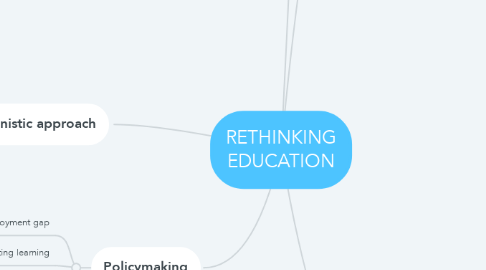
1. An emerging global context for learning
2. Humanistic approach
2.1. Approach
2.1.1. Countering dominant discourse
2.1.1.1. Education is not only about the acquisition of skills, it is also about values of respect for life and human dignity required for social harmony in a diverse world.
2.1.1.1.1. Erhical issues
2.1.1.1.2. Amartya Sen
2.1.2. Beyond scientific humanism (Julian Huxley, Faure 1972)
2.1.2.1. sustaining and enhancing the dignity, capacity and welfare of the human person in relation to others, and to nature, should be the fundamental purpose of education in the twenty-first century.
2.1.2.2. Values
2.1.2.2.1. respect for life and human dignity, equal rights and social justice, cultural and social diversity, and a sense of human solidarity and shared responsibility for our common future
2.1.2.3. Dialogical approach (Buber)
2.1.2.4. reject learning systems that alienate individuals and treat them as commodities, and of social practices that divide and dehumanize people.
2.1.3. Goals: suatainability and peace
2.1.3.1. environmental stewardship and concern for social justice
2.1.4. Skills to develop transformative attitudes
2.1.4.1. critical thinking, independent judgement, problem-solving, and information and media literacy
2.1.4.2. Competencies are broader in scope
2.1.4.3. Foundation, transferable, technical and vocational (p. 40)
2.1.5. integrated and humanistic approach to education, as that presented in the 1996 Delors Report
2.1.6. Integrated approach
2.1.6.1. overcomes the traditional dichotomies between cognitive, emotional and ethical aspects.
2.1.6.2. Reinterpreting and protecting the four pillars of education
2.1.6.2.1. # Learning to know – a broad general knowledge with the opportunity to work in depth on a small number of subjects. # Learning to do – to acquire not only occupational skills but also the competence to deal with many situations and to work in teams. # Learning to be – to develop one’s personality and to be able to act with growing autonomy, judgment and personal responsibility. # Learning to live together – by developing an understanding of other people and an appreciation of interdependence.
2.1.6.2.2. pillars themselves might need fresh interpretation, given growing concern for sustainability.
2.1.6.2.3. Learning to learn
2.1.7. Rethinking curriculum development
2.1.7.1. a humanistic curriculum is certainly one that raises more questions than it provides answers
2.1.7.2. policy dialogue to define educational goals must be participatory and inclusive
2.2. Inclusion
2.2.1. Disability
2.2.2. Gender
2.2.3. Cases
2.2.3.1. Children with disabilities are often overlooked
2.2.3.2. Senegal: The ‘Case des Tout-Petits’ experience
2.2.3.3. Intercultural Universities in Mexico
2.3. Transformation
2.3.1. Towards networks of learning spaces
2.3.2. Emerging learning spaces
2.3.2.1. The ‘Hole-in-the-Wall’ experiment
2.3.3. Mobile learning
2.3.3.1. Mobile literacy for girls in Pakistan
2.3.4. MOOCs
2.3.5. Challenges to university
2.3.6. schooling remains as important as ever. It is the first step in institutionalized learning and socialization beyond the family, and it is an essential component of social learning: learning to be and learning to live together
2.4. Role of educators
2.4.1. Digital technologies do not replace teachers
2.4.2. Reversing the deprofessionalization of teachers
2.4.3. Challenges for the academic profession
3. Policymaking
3.1. Employment gap
3.2. Recognizing and validating learning
3.3. Citizenship
3.4. Global governance
4. Central concern for sustainable development
4.1. Challenges and tensions
4.1.1. Economic production & consumption vs ecological stress
4.1.2. Greater wealth vs greater vulnerability & inequalities
4.1.3. Growing interconnectedness vs rising intolerance & stress
4.1.4. Human rights progress vs challenges
4.2. New knowledge horizons
4.2.1. Cyber world
4.2.2. Neuroscience
4.2.3. Climate chance & energy sources
4.2.4. Creativity & cultural innovation
4.3. Alternative approaches to be explored
4.3.1. Acknowledging diversity
4.3.2. Integrating knowledge systems
4.3.3. Re-visioning education
5. Definitions
5.1. Knowledge
5.1.1. central to any discussion of learning and may be understood as the way in which individuals and societies apply meaning to experience. It can therefore be seen broadly as the information, understanding, skills, values and attitudes acquired through learning. As such, knowledge is linked inextricably to the cultural, social, environmental and institutional contexts in which it is created and reproduced.
5.2. Learning
5.2.1. the process of acquiring such knowledge. It is both a process and the result of that process; a means, as well as an end; an individual practice as well as a collective endeavour. Learning is a multifaceted reality defined by the context.
5.3. Education
5.3.1. learning that is deliberate, intentional, purposeful and organized. Formal and non-formal educational opportunities suppose a certain degree of institutionalization.
5.4. Informal education
5.4.1. may include learning activities that occur in the work place (for instance, internships), in the local community and in daily life, on a self-directed, family-directed, or socially-directed basis
5.5. Informal learning
5.5.1. inherent to all experiences of socialization. The discussion that follows, however, is restricted to learning that is intentional and organized....
